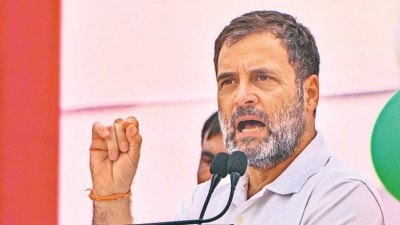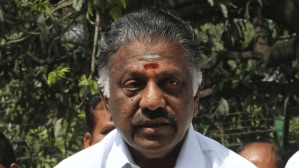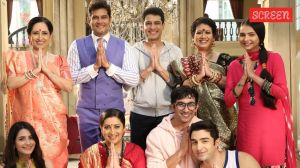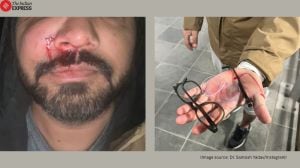Delays in admissions, irregularities in PhD entrance process: Teachers’ body raises concerns over ‘chaos’ in JNU
According to the academic calendar, continuing students are scheduled to begin registering on July 2, with classes starting on July 9. However, the first round of UG and PG admissions will only conclude by July 29
 In a sharp criticism of the current admission process, the JNUTA pointed out that students who took the NET exam in June would be excluded, as results wouldn’t be out in time (Archive)
In a sharp criticism of the current admission process, the JNUTA pointed out that students who took the NET exam in June would be excluded, as results wouldn’t be out in time (Archive)Days before Jawaharlal Nehru University reopens for the new academic year, its teachers’ association has raised sharp concerns over what it calls the “chaos and mess that has become typical of the JNU of today”.
In a statement released on Monday, the Jawaharlal Nehru University Teachers Association (JNUTA) slammed the administration for delays in admissions, irregularities in PhD entrance processes, and what it termed the Vice-Chancellor’s “undemocratic” functioning.
According to the academic calendar, continuing students are scheduled to begin registering on July 2, with classes starting on July 9. However, the first round of UG and PG admissions will only conclude by July 29, with further rounds planned until August 14.
This staggered schedule, the JNUTA said, creates a deeply unequal semester experience. “For new entrants, the duration of classes in the monsoon and winter semesters of academic year 2025-26 may be roughly similar, while the continuing students will have a monsoon semester, which is longer… by over a month,” it said.
PhD admissions are also delayed expected to take place only through September. In a sharp criticism of the current admission process, the JNUTA pointed out that students who took the NET exam in June would be excluded, as results wouldn’t be out in time.
The Indian Express tried reaching out to the varsity administration over JNUTA’s remarks but did not get a response.
Beyond timing issues, the teachers’ association has flagged a fundamental flaw in how JNU is preparing its merit lists for PhD candidates. It accused the university of “bizarre and completely illogical practice” of combining percentile scores from the NET exam with raw viva voce scores, calling it a statistical misstep with serious consequences.
“This simply cannot be done,” the statement said. “Percentile scores… can be significantly different from the actual marks… In many cases, it will end up rendering redundant the marks secured in the written examination… making the marks secured in the viva-voce the effective determinant.”
The teachers’ body argued that such practices have reduced the written exam — which is supposed to have 70% weightage — to a mere formality, undermining transparency and fairness. “This should be considered a public embarrassment for the institution,” the JNUTA said, adding that “the JNU administration has no sense of shame, and is only preoccupied with proving that it is ‘complying’ with orders from above.”
The teachers’ body also took issue with the way the administration abandoned faculty consultations over reviving JNU’s entrance exam. “These opinions have been effectively ‘lost in transit’ and never formed the basis for deliberations in the Academic Council,” it said, referring to Centre and School-level feedback. Ironically, it added, “most of the Deans that the JNUTA delegation met… said they had written in favour of JNU conducting its PhD entrance exams.”
The JNU students’ union, too, has been pushing for a meeting over the past week to discuss the implementation of the in-house entrance examination.
Last year, the varsity opened the possibility to bring in the JNU Entrance Exam (JNUEE) after the UGC NET scam erupted when the Ministry of Education had decided to cancel it due to its integrity being compromised. This is when Vice-Chancellor Santishree Dhulipudi Pandit had said that they would consider the views of the stakeholders of the varaity to reintroduce the examination.
In a letter dated June 28, JNUSU President Nitish Kumar, Vice-President Manisha, and General Secretary Munteha Fatima responded to the Vice-Chancellor’s earlier communication, saying: “While we welcome this step toward dialogue, we must address several concerns,” referring to the university’s justification for scrapping the JNU Entrance Exam (JNUEE). The union questioned the basis of the estimated ₹5,000 cost per student cited by the Dean of Students and noted that most Deans and Chairpersons had supported the reinstatement of the JNUEE. They also reiterated that “JNUSU is a legitimate, collective body,” and proposed a meeting with “all relevant officers” and “JNUTA representatives.”
In response, the Vice-Chancellor, in a letter sent as response, wrote: “It is your organisation, JNUSU, and your responsibility to be inclusive whether they agree or not. It is a democratic practice to be inclusive.” While agreeing to the demand for a broader meeting with stakeholders, the -C added that if JNUTA representatives are to be included, “I will have to invite JNUTF (JNU Teachers Federation) as there are two Teachers’ bodies,” the V-C said, ensuring equal representation.












